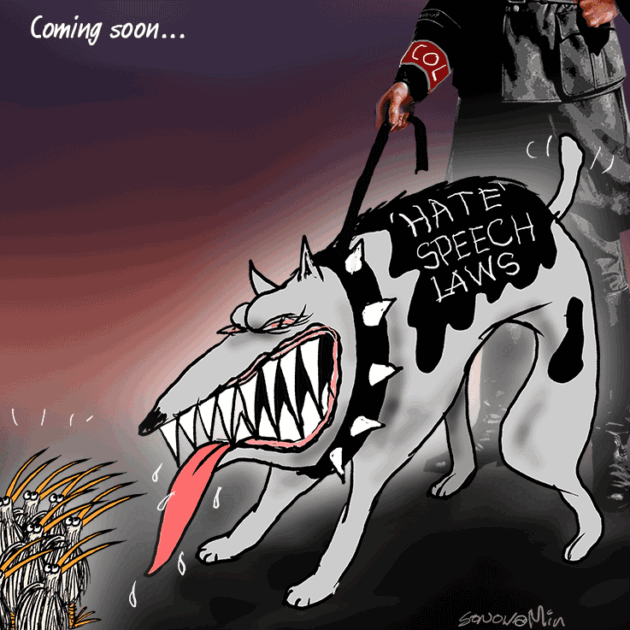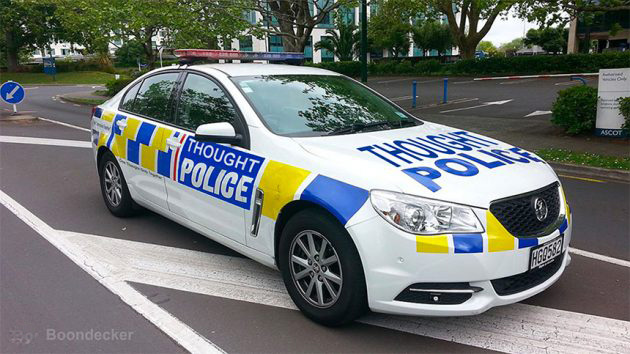Flying somewhat, and so far, under the radar following the anniversary of the alleged-murderer Tarrant’s despicable deeds are the proposed follow-up of controls on so-called “hate speech.” They have been subject to considerable speculation in the year since, this despite zero evidence produced or alleged so far that home-grown New Zealand hate speech either motivated or detracted from the insane killer’s motives.
Maybe there have been deranged interactions between the barbarous Australian and fellow New Zealand-based eco-Fascists or whatever they want to call themselves, but if there are they certainly have not surfaced publicly, nor has anyone, local or otherwise, been arrested in connection with advocating, planning or committing the atrocity.
Nevertheless we are informed of ‘imminent’ new legislation (just weeks away, possibly) justified on such dubious grounds.
A reasonable person may have inquired first as to what cause could be shown before the effect of restrictions on freedom of speech, such a fundamental and extremely important freedom, became justified here.
Failed electoral seat candidate, failed Labour Party leader and current Justice Minister Andrew Little, conveyancer of the conversations so far taking place away from public view, seems to be promoting agitprop: a pretence that there are hotbeds of race-supremacists huddled over their keyboards spreading vile messages and intimidating ethnic minorities on the inter-web of ideas. But if that is the case (and there are bound to be isolated examples), we already have laws in place to discourage such behaviours, as pointed out by Mr Little himself on April 28th, 2019:
“The reality is we already have laws to protect against what we call “hate speech”, which are the Human Rights Act and the Harmful Digital Communications Act. These criminalise incitement of racial disharmony through written or verbal expression, and refusal to remove social media posts which are bullying or include humiliating intimate information about someone.”
In fact, both Acts cited by Little have specific protections against the denigration of religious belief-holders.
The discussions so far on the proposed ‘Hate speech’ legislation, described by the Justice Ministry’s CEO Andrew Kibblewhite as “a tricky thing”, are taking place away from public scrutiny since Mr Kibblewhite said:
“They wanted some of the conversation to happen away from the political fray because it could easily be derailed with so many strongly held strange visions.”
The Dominion Post March 14th 2020
Whatever might “strongly held strange visions” mean?
The framework document spoken of by Kibblewhite in response to Little’s call for new legislation “Korero Whakamauahara (Hate Speech)”, a document produced and promoted by the NZ Human Rights Commission (NZHRC), is very concerning in light of Little’s and Kibblewhite’s comments, especially when such a body, operating under the illusory objective of protecting the rights to freedom of expression as guaranteed under the NZ Bill of Rights Act, supplants the entirely objective view of actual ‘Hate-speech’ with an entirely subjective interpretation:
“the mistaken propensity to focus on the ideas being expressed, rather than on the effect of the expression.”
“[T]he harm at which the legislation is directed is not the expression itself, but the presumed effect of that expression on the minds of third parties.”
“The term hate speech can be misleading because it is often used loosely and pejoratively to imply a moral breach and is directed at the speech or expression itself. However, hate speech laws are not intended to protect people from offence or to supress ideas. They are targeted at the effect that the expression has on the minds of third parties.”
I’m sorry; NZ Human Rights Commission, you may not be aware that the modern media world, and therefore politics, is headlined by Offenderati who take to umbrage mountain as often as possible with as little molehill traction as possible. They are sustained, it could be said, by odours de minimis. The merest scent of a tantalising trifle will be reacted to with hyperbole. They will express themselves as being indignant and outraged because of having received wounding words. They will arbitrarily and emotionally imagine ill effects on themselves, their cohort, their people or their believers due to having viewed images or graphics and those imaginings will be gleefully repeated by our unctuous press.
What NZ HRC is proposing, returning sixteen times to the theme in just forty-eight pages, is that the opaque “effect” of words should be more considerable than the actual words transparently expressed, and such a proposal is extremely chilling.
It gets worse: the document argues that any hate-speech law should provide for determining the ‘intent’ of such expressions as come to notice, presumably as a result of the ‘effect’ on the aggrieved.
It encourages the idea of Thought Police deciding, determining, what the speaker, writer, editor, artist or director of ‘offending’ words or images really meant. It’s akin to the appointment of a Commissar of Public Communication to dissect and determine the true meaning of any and all complained-of criteria and it’s not on. Not in this society.
There is no place in New Zealand life and public affairs for people to pretend to know what’s inside a person’s head when they speak, write or film, or to assign to them motives or morals not explicitly stated, to guess at their motivations and to hang them for it, figuratively.
The NZ HRC document refers repeatedly to the UK’s “stirring up” legislation (‘stir’, ‘stirred’ or ‘stirring’ appearing 52 times in the document), perhaps unsurprisingly given Commissioner Hunt’s background in extreme-left UK politics (he’s a Corbynite), but those subjective statutes have already had repercussions as far away as New Zealand, rebounding on the left as it happens – but that shouldn’t be applauded.
Emeritus professor James Flynn of Otago University, author of several works debunking racial intelligence stereotyping (he’s also eponymous; the ‘Flynn affect’ on IQ is named for him), but who despite being a hardened leftist is a fierce advocate for the free expression of ideas, suffered the affront of having a book-deal scuttled on the basis of the “effect” some of the book “In Defense of Free Speech: The University as Censor” content may have had on Offenderati.
That Andrew Little’s, and NZ HRC’s, push for these Nineteen-Eighty-Four proposals in God’s Own Country have been shunted surreptitiously, thus far, away from public view, away from the disinfectant of sunlight, is an affront to democracy and freedom.
Despite the temporary imposition of emergency biological protocols during our time of peak alarm this awful proposed legislation needs to be protested and criticised by all lovers of freedom. It is actually more important than Covid-19 because while infection from a virus may persist several days, perhaps weeks, maybe months, these Leftist free-speech controls will reverberate for decades; if allowed to pass.

If you enjoyed this BFD article please consider sharing it with your friends.

